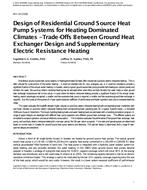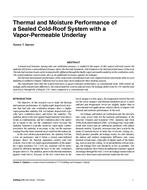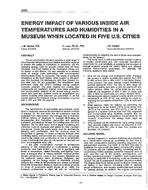The effectiveness of flat roof insulation is reduced by the presence of moisture. It will increase energy transfer by conduction and, under certain conditions, by an evaporation-condensation process, in which moisture moves from warm to colder regions of the insulation.
This paper is primarily devoted to the effect where the moisture content is 1% by volume, or less, in summertime, although data for higher moisture contents are included for comparison purposes. It presents results for glass fiber insulation placed on the roof of an outdoor test building, where it underwent temperature changes produced by the prevailing weather conditions. The swings in outdoor temperature produced daily reversals in temperature difference across the insulation.
Heat flows through the roof and the temperatures at the top and bottom surfaces of the insulation were measured with heat flux transducers and thermocouples, respectively. The data were recorded digitally every 20 minutes and analyzed by computer.
The measured values were compared to values estimated for dry insulation subjected to the same temperature conditions. The results indicate that a significant increase in energy exchange (gain and loss) through the roof occurred for moisture contents less than 1% by volume.
Units: SI
Citation: Symposium, ASHRAE Transactions, 1988, vol. 94, pt. 2, Ottawa
Product Details
- Published:
- 1988
- Number of Pages:
- 16
- File Size:
- 1 file , 1.2 MB
- Product Code(s):
- D-OT-88-12-1


